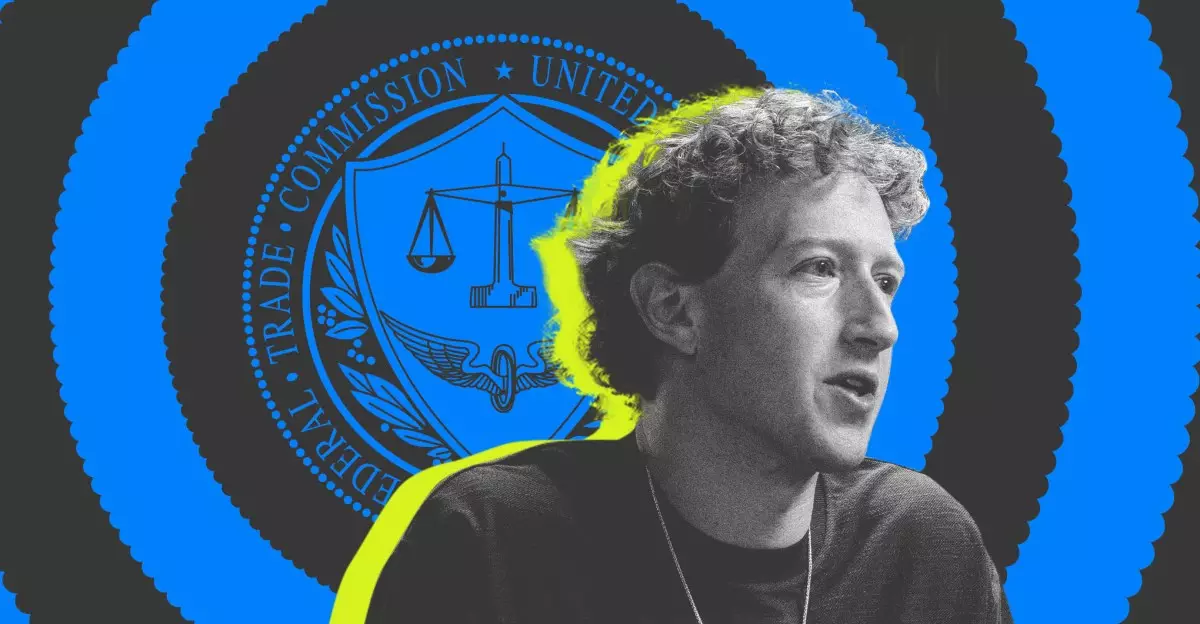Meta’s transformation from a modest social networking site into a sprawling digital conglomerate has been nothing short of revolutionary; yet, it’s also rife with contentious moments that raise questions about the price of such dominance. Founded originally as Facebook, the platform emerged from the dorm rooms of Harvard University in 2004, capturing the attention of millions worldwide. However, the choices made by its CEO, Mark Zuckerberg, could have led to vastly different outcomes had he treaded alternate paths. Recent courtroom testimonies provide a vivid illustration of how those decisions unfolded and the potential ramifications carried with them.
In a federal courthouse in Washington, D.C., Zuckerberg found himself on the stand for what would amount to over nine hours of questioning, presenting a rare opportunity to dissect both his leadership ethos and the underlying motivations for acquiring competitors like Instagram and WhatsApp. The Federal Trade Commission (FTC) is asserting that Meta’s expansion into these services was not merely opportunistic but rather a strategic maneuver engineered to stifle competition. This portrayal of Meta as an aggressive monopolist seeking to quash nascent rivals garners both support and skepticism, raising essential questions about market definition and anti-competitive behavior.
Market Dynamics and Competitive Landscape
During his testimony, Zuckerberg posited that competition in social networking is not static. Describing the market as “fluid,” he acknowledged that TikTok, YouTube, and messaging service iMessage now pose significant threats to Meta’s reach. However, his assertion diverges sharply from the FTC’s characterization of a market centered primarily around personal social networking services that emphasizes connections with friends and family.
What stands out here is Zuckerberg’s recognition of evolving industry dynamics. His oblique insistence that market definitions can be contorted to serve regulatory motives echoes a sentiment frequently found among leaders of major corporations facing scrutiny. Instead of adhering to a strict definition of competition as set by regulators, Zuckerberg suggests that various services might integrate features and purposes traditionally viewed as distinct. This perspective speaks not only to the complexities of the digital landscape but also to the difficulties regulators face in keeping pace with innovation.
Monopolistic Accusations and Past Missed Opportunities
Zuckerberg’s courtroom narrative revealed fascinating insights, including his reflections on missed opportunities that could have placed Meta on different trajectories. One notably caught attention: had Snapchat’s Evan Spiegel consented to a $6 billion acquisition offer in 2013, Meta may well have altered its growth trajectory significantly. This admission emphasizes not just the competitive instincts that drive tech moguls, but also the sheer unpredictability of what could have been.
Moreover, internal communications laid bare concerns that Zuckerberg harbored about falling behind Instagram while keeping a wary eye on various messaging apps, recognizing that these platforms could encroach upon Facebook’s socio-digital ecosystem. These disclosures paint a portrait of a leader grappling with competition and market shifts while making mile-high strategic decisions that have far-reaching implications for users and competitors alike.
The Philosophy Behind User Experience and Advertising
Among the more controversial musings shared during his testimony was Zuckerberg’s musings on user experience—specifically the concept of radically restructuring Facebook by wiping users’ friends lists clean. This provocative notion encapsulates a philosophy that is both intriguing and alarming. The idea of forcing users to start anew, ostensibly to recapture an initial sense of wonder and community, raises questions about agency, autonomy, and the power dynamics inherent in platform use.
Zuckerberg’s earlier contemplation of an advertisement-only feed exemplifies the tension underlying Meta’s monetization strategies. While this hypothetical reflects an understanding of the importance of ad engagement, it also starkly highlights the ethical dilemmas associated with maximizing profit at the potential expense of user experience. Such decisions resonate through the industry, illuminating just how intertwined profit motives and innovation can become.
Internal Tensions and the Cost of Growth
Emails and messages exchanged among Meta’s top executives revealed more than just strategic considerations; they illuminated the psychological pressure to maintain growth, often leading to actions that could easily be seen as detrimental to competitive fairness. Fear of obsolescence was palpable, as executives wrestled with both external market forces and the internal imperatives of a company that was rapidly scaling.
This sense of urgency—both to innovate and to consolidate—creates an environment ripe for aggressive market strategies, which bring us back to the crux of the antitrust case. As Meta confronts an impending requirement to potentially divest Instagram and WhatsApp, the unfolding drama in the courtroom highlights not only the stark realities of corporate power but also the enduring implications for consumers, competitors, and the digital landscape as a whole. In every choice made, echoes of what could have been reverberate, underscoring the risks that accompany ambition, innovation, and the relentless pursuit of market supremacy.

